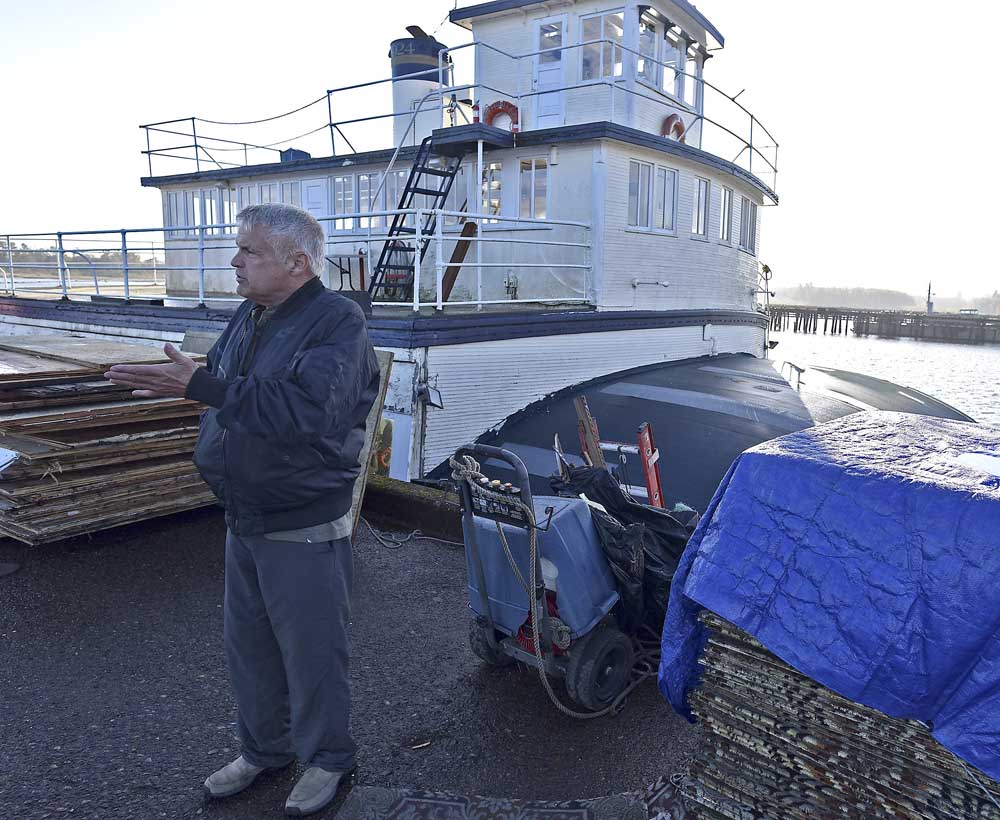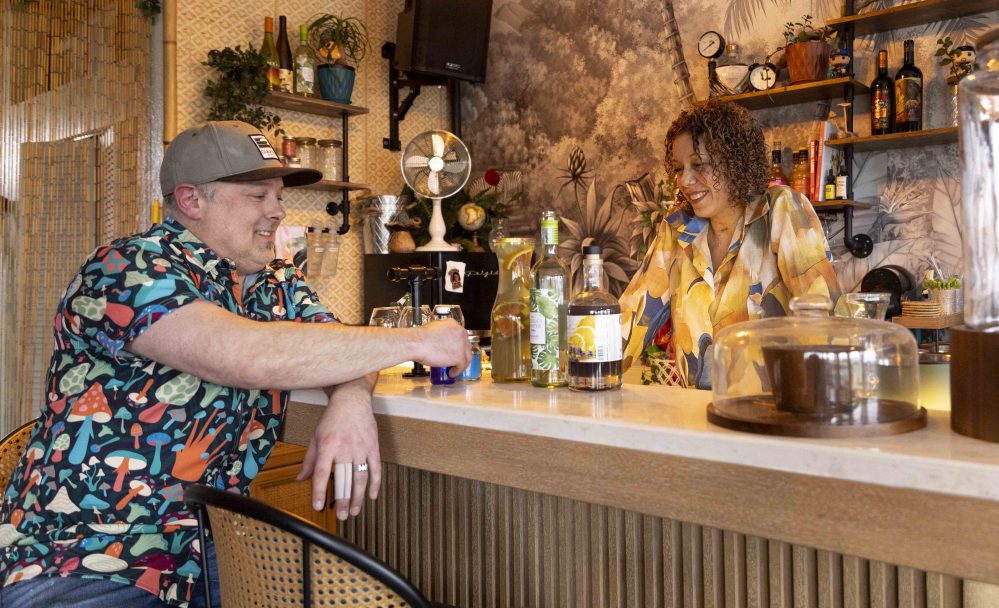Jacob was an Astoria entrepreneur
Published 12:29 pm Monday, September 10, 2018

- Robert ‘Jake' Jacob helped with the restoration of the Tourist No. 2 ferry.
Robert “Jake” Jacob, a colorful character with an entrepreneurial spirit who had a hand in creating and preserving landmarks in his hometown of Astoria, died on Monday.
Jacob, 69, died of natural causes in his Astoria home, according to the Astoria Police Department.
Best known as the owner of the Cannery Pier Hotel, Jacob was also involved with the restoration of the Liberty Theatre and was key to bringing the Astoria Riverfront Trolley to the Astoria Riverwalk.
The developer was also behind efforts to purchase the Astoria Armory and reopen it for community events, as well as the campaign to bring the Tourist No. 2, an old ferry that plied the Columbia River, back to the waterfront.
“We have lost an icon,” said Jeff Daly, a longtime friend. “A man with a passion for Astoria like never seen before. … You can go anywhere in Astoria and feel the energy of his vision and see what he saved for all of us.”
Jacob was born in Astoria and graduated from Astoria High School in 1967. He attended the University of Oregon and later joined the Army. He documented his misadventures as a young man in a memoir published this year with the title, “I Wouldn’t Recommend This: What Not to Do Spring Term of Your Senior Year in College.”
In the memoir, he described how he moved back to Astoria after dropping out of college — a town that “I’d spent the last eight years trying to leave.”
That feeling changed as he got older. He became an advocate for his hometown, coming up with one “crazy idea” after another to help breathe life into the city.
“He could see things other people couldn’t see,” said Donna Quinn, director of sales and marketing for the Cannery Pier Hotel. She called Jacob a friend and a mentor. “He had a lot of funny, crazy ideas and he made some of them happen and others are now lost to us.”
Jacob struggled for most of his life with alcoholism. He was often candid about his drinking and his attempts at recovery. He described taking on numerous hobbies to distract himself from drinking, and checked in for treatment several times.
“I think we can have great compassion for that struggle that many people face,” Quinn said.
He was “a man with truly demons in his head with a stroke of genius you couldn’t find anywhere else,” said Daly, who was several classes behind Jacob in high school. Everybody tried to help Jacob — friends, former classmates — and “he would beat us up for being there.”
His former partner, the artist Sarah Goodnough, said the dark times, especially his difficulties in his 20s and 30s, contributed to his drive and generosity later in life.
“It caused him to be demanding of himself,” she said. “And demanding of other people, demanding the best.”
“His biggest contribution truly was having people see their own greatness,” she added, “and having people realize their own dreams for themselves. … I think the man, who he was, was magic. He just thought differently than everybody else.”
Jacob was known for freely giving money and support to others. He was the kind of person who would donate to causes or projects, but not make a fuss about his involvement. Or he’d slip money to someone he knew needed it — to the guy passing through town with all his possessions in a backpack, or to a person who Jacob thought could use the cash to build or create something.
In the late 1990s, Steve Forrester, the now-retired publisher of The Daily Astorian, was part of a group that had long been interested in acquiring the Liberty Theatre and turning it into a performing arts center. He met Jacob and told him about the group’s troubles in working with the theater’s owner.
“Well, maybe I’ll buy it and sell it to you,” Forrester recalled Jacob saying.
Jacob undertook six months of the “most horrendous negotiations” to get the theater’s owner, Edward Eng, to agree to sell the downtown building. Finally, Eng accepted Jacob’s offer, but, as Jacob told it, “he said there’s no way in hell that the candy he had just bought (for the theater) goes with the price.”
So Jacob, Eng and a 20-year-old helper spent a long Sunday night at the theater, counting candy.
“They kept screwing up and finally at midnight I said, pick a number, I’m leaving,” Jacob wrote in an essay on a personal website about the ordeal. “He came out of the candy closet mad and said, ‘There’s at least $4,000 worth in there.’ I said, ‘Pick another number.’ He said, ‘$3,000.’ I said, ‘Pick another number.’ He said, ‘$2,500.’ I said, ‘You’ve got one more chance. Try again or I quit.’ I meant it. Christ, it was candy. He said, ‘$1,800.’ I said, ‘We’re done. I’ll meet you tomorrow morning at the title company.’”
The next day, the papers signed, Jacob ran over to the newspaper office to tell Forrester the good news: “I told him we had bought it on a contract and it was assignable and I could assign it to Steve’s Friends of the Liberty immediately without Mr. Eng’s consent. Steve said that this is serendipitous. I said, ‘What does that mean?’”
Forrester said Monday that Jacob’s role in putting the Liberty Theatre into local ownership was “pivotal and absolutely essential to the rebirth of downtown.”
People said Jacob had an ability to see what others overlooked or couldn’t imagine. He bought a broken-down, 100-year-old dock and began construction on the Cannery Pier Hotel in the early 2000s.
It was a project that many didn’t believe he could pull off, requiring the construction of a new dock, multiple zone changes and complex approvals. He was rejected by five banks and had to battle county, state and city agencies.
The hotel, which rests on pilings that once supported the Union Fishermen’s Cooperative Packing Co. and juts out 600 feet over the Columbia River, is now a modern-day landmark, its design reminiscent of the old cannery buildings that used to line the river. As other hoteliers attempt to build near the water, city boards often reference the hotel as a sort of gold standard for new construction and emphasize how it creatively deviates from the standard boxy design of many large hotels.
In a documentary about the building of the Cannery Pier Hotel, Jacob said that he didn’t appreciate the Columbia River when he was growing up in Astoria.
“But as Astoria and I got older, I realized how fascinating this river and its traffic could be,” he says in a voice-over narration. “I felt if I could get the people into the channel rather than just being observers on the shore looking at the water, they could feel like they were part of the experience.”
For Dulcye Taylor, the owner of Old Town Framing Co. and president of the Astoria Downtown Historic District Association, the Cannery Pier Hotel illustrates Jacob’s approach to a challenge perfectly: “You can tell me I can’t do it, but I’m going to do it.”
He instilled this same toughness in the board of directors for the Tourist No. 2, which was brought back to Astoria in 2016, Taylor said. Taylor is one of six board members for the ferry, along with City Councilor Cindy Price.
Quinn believes bringing the ferry to Astoria and the work to restore it will be part of Jacob’s lasting legacy. But he will also be remembered for bringing the trolley, now a fixture of the waterfront and a major draw for tourists, to the Riverwalk in the 1990s and putting the Armory back to use in the community.
Jacob saw potential in the old National Guard armory next to the Clatsop County Heritage Museum. The building was up for sale, but the majority of the town thought it was “too big, too old, too outdated, too run-down and too expensive to be viable,” he wrote about the project. Now the Armory is a haven for children and hosts everything from birthday parties to anti-bullying meetings, skate nights and even donkey basketball.
Jacob also helped launch what he called “weird stuff,” including a festival celebrating the 1998 film “The Big Lebowski.” He was also plotting an “Astoria UFO and Real Alien Festival.” He wrote two books: the memoir about his 20s and a children’s book called “Sarah’s Circus” co-written and illustrated by local artist Sally Lackaff.
“He’s touched so many lives,” said Michelle Roberts, Jacob’s girlfriend of the past three years. “I truly believe Astoria is what it is today because of him.”
In 2015, Jacob’s brother, Greg Jacob, organized a “roast and toast” in Jacob’s honor. The roast was a complete surprise to Jacob, who, nevertheless, crowned with a bowling pin headdress, managed to turn the entire roast around to get his own jabs in. He “turned the tables and somehow roasted half the people in attendance,” Greg Jacob told The Daily Astorian’s In One Ear column.
More than 100 people attended the roast and Jacob knew every last person. Nearly every time someone reared up and declared, “I’ve got a Jake story,” he would interrupt: “Oh, yeah? Well I’ve got a story about you!”
Jacob summed up his own story on his website, where he collected bits of writing: “Basically this is about how a guy can have a great start, blow it all up, lose everything multiple times and then grovel and crawl his way out before it gets too late.”
Jacob has a daughter, Cheryl, who lives in California. His brother, Greg, and his family live in Portland.
There will be a community celebration of Jacob’s life on Nov. 3 from 2 to 6 p.m. at the Astoria Armory. Family is asking for donations to the Astoria Ferry in Jacob’s name to honor his memory in lieu of flowers.





